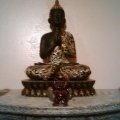Welcome home! Please contact lincoln@icrontic.com if you have any difficulty logging in or using the site. New registrations must be manually approved which may take several days. Can't log in? Try clearing your browser's cookies.
Birth is inherently bad
 Carameltail
UK Veteran
Carameltail
UK Veteran
I have seen this idea of anti-natalism put forward, where life is an never ending cycle that you have to escape. That it is better in most cases to avoid birth, because it is likely to lead to suffering and enlightenment is unlikely.
I don't consider that true, though I do consider things like overpopulation in the world of today and certain sorts of limitations suffering should be taken into account, birth and death feel neutral overall at least in some circumstances.
1


Comments
That seems to equate enlightenment in the sense of liberation from the cycle of birth, aging and death with antinatalism. I found a similar position in the antinatalism entry at Wikipedia:
“[Birth] is thus the cause of old age and death”; therefore, don’t procreate. If this is the kind of interpretation to which you’re referring, I’d say it’s flawed. It overlooks the Buddha’s teaching on the cause of birth: craving. From a samsaric viewpoint, antinatalism might succeed only in preventing some rebirths as a human. Since a human birth is most favorable to enlightenment, preventing human births would, from this perspective, perpetuate instead of reduce suffering.
Exactly. I'd wager this is why Buddha got up from that tree to spread the dharma instead of just rotting away which would be the logical choice if an aversion to life was the way to go.
Thank Buddha and Fish Gods I was born semi-human.
Now wot? Be more humane ... in this very kindness, in the very bodhi, in this very momentous ...
Birth is not inherently bad, though it kickstarts the DO process.
Nobody asked me if I wanted to be born, and I did not ask my son if he wanted to come into this world.
Birth happens, and will continue to happen.
And since we are here, let's embrace this wonderful mystery and make the most of it
Yet we are responsible for putting more humans onto the planet. I think while humans may be most suited to finding enlightenment, they are also very damaging to the planet as a whole in how they express greed.
It’s the major reason why I decided not to have children. And I’m not sure that any race which isn’t able to manage the continuation of its home ecology is suitable to survive as a species.
We struggle with garbage and fish stocks while we still burn down the rain forest at a huge rate every year and manage to avoid doing anything about climate change.
@Kerome, I would agree if we distinguish between humans and the technologically advanced civilizations of humans. Some still live harmoniously with their environment. When climate change crosses culling level thresholds for us this time, my then worthless money will be on those tribal societies with the skills and resilience to find greener pastures. We have always been catastrophically too smart for our own good, but some humans have been wisely doing the same thing for a couple hundred thousand years and, to date, no amount of stupidity has deterred them. Whatever a person's societal circumstances and their eventual outcome, each still has the individual opportunity to develop wisdom.
If by bad you mean unsatisfactory then yes...this being the First of the Noble Truths
This it would seem is displayed by your question...